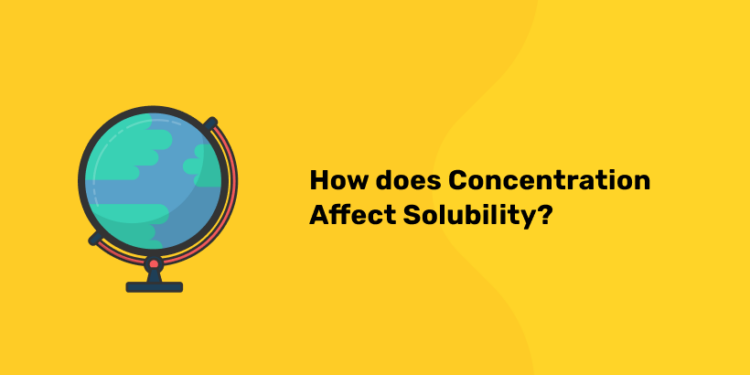Table of Contents
Before going to the topic let us discuss what is actually a solution ? A solution is a homogenous mixture of two or more substances generally solute and solvent. A solution exists in all three forms of matter; liquid, solid and gas. There are two components present in a solution. They are solvent and solute. A solvent is a substance in which a solute dissolves to produce a homogeneous mixture. A solute is a substance that dissolves in a solvent to produce a homogeneous mixture.
Properties Of A Solution
- It is a homogeneous mixture.
- The particles in a solution cannot be seen through naked eyes.
- The components of a solution cannot be filtered.
- Colligative properties include (vapor pressure, boiling point, freezing point, and osmotic pressure) depends on the the total number of dissolved particles in solution, not on their chemical nature.
- Solutions are stable in nature, which means solute particles never tranquilize when they are allowed to stand for long time.
What Is Concentration Of A Solution ?
1: Who was the first woman President of India?
Concentration is the quantitative amount of solute dissolved at any concentration in a solvent. The concentration of a solution is a measure of the quantity of solute that has been dissolved in a given quantity of solvent or solution. One that contains a relatively high volume of dissolved solute is a concentrated solution. and one with minimal volume of dissolved solute is a dilute solution.
Attempt Free GK Mock Test – Download ENTRI App !
Free UPSKILLING Courses!
Take your first step toward mastering in-demand skills, acing interviews, and securing top-tier jobs with Entri's free upskilling courses.
Start Learning!What Is Solubility ?
Solubility is typically a limit to how much solute can dissolve in a given amount of solvent. Solubility is the property of a solid, liquid or gaseous form of a chemical solute to dissolve in a solid, liquid or gaseous solvent to form a solution. The solubility depends on the physical and chemical properties of both solute and solvent. The solubility of a substance is effected by temperature, pressure and PH of the solution. The level of the solubility of a substance in a specific solvent is measured as the saturation concentration, that means adding more solute does not increase the concentration of the solution but the extra amount of solute will begin to percipitate.
Solubility is typically a limit to how much solute can dissolve in a given amount of solvent. Concentration is the quantitative amount of solute dissolved at any concentration in a solvent.
How Concentration Affects The Solubility
Concentration gives the amount of substances in a solution. Solubility is the ability of a substance to dissolve in another substance. If the solubility of a material is high in a solvent, then its concentration will be high in the solution. Similarly, if the solubility is low, concentration will be low.
Depending on the state of solute concentration of the solution may varies.
- Solubility of liquid in liquids
Based on the concentration of solute dissolves in a solvent, solutes are categorized into highly soluble, sparingly soluble or insoluble. If a concentration of 0.1 g or more of a solute can be dissolved in a 100ml solvent, it is said to be soluble. While a concentration below 0.1 g is dissolved in the solvent it is said to be sparingly soluble. Thus, it is said that solubility is a quantitative expression and expressed by the unit gram/litre (g/L).
- Solubility of solid in liquids
When a solid solute is added to a solvent, the solute particles dissolve in the solvent and this process is known as dissolution. Solute particles in the solution collide with each other and some of these particles get separated out of the solution, this process is called crystallization. At this point a state of dynamic equilibrium formed that is the number of particles entering into the solution become equal to the number of particles leaving the solution. As a result, the concentration of the solute in the solution will remain constant at a given temperature and pressure. If a solution contains maximum amount of solute, it cannot be dissolved into the solution at a given temperature and pressure. Such solutions are called saturated solutions. The concentration of solute in such a solution is called its solubility at that temperature and pressure. If more solute can be added to a solution then it is called an unsaturated solution.
Grab The Latest Study Materials For Government Exams! Register Here!
- Solubility of gases in liquids
There are two main factors that affect the solubility of gases in liquids. They are temperature and pressure. The solubility of this state also depends on the nature of solute and solvent.
If we compress the gas molecules in a solution by increasing the pressure, the concentration of the solution increases by a smaller volume and decreasing the pressure will decrease the concentration by a smaller volume. There is a law called Henry’s law related to this. It states that “The solubility of a gas in a liquid is directly proportional to the partial pressure of the gas present above the surface of liquid or solution”.
P = KHx
Where, p = partial pressure of the gas
x = mole fraction of the gas in solution
KH = Henry’s law constant
There is principle called Le Chatelier’s Principle related to effect of temperature of a gaseous solution. It states that when the equilibrium of a system is disturbed, the system readjusts itself in such a way that the effect that has caused the change in equilibrium is countered. That means if we increase the temperature of gas molecules, the concentration of the solution will decrease. That means the solubility of gases in liquids decreases with increasing temperature.
Attempt Free GK Mock Test! Download Entri App!
The extent of the solubility of a substance in a specific solvent is measured as the saturation concentration, where adding more solute does not increase the concentration of the solution and begin to precipitate the excess amount of solute.
Aspirants who are preparing for competitive exams like Bank Exam, UPSC exam and other Government Exams have to be focused on General Knowledge also. Here our ENTRI app provides you with the best knowledge in GK and coaches candidates on different exams in your local language. So feel free to use our app and achieve your dream job.














